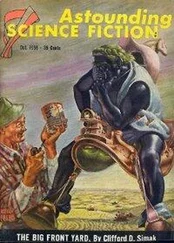“It was a jury-rigged job,” said Clyne, the physicist. “They tore out a lot of stuff and rebuilt the engine for some reason or other and there was a lot of the stuff they tore out that they didn’t use again. For some reason, they had to rebuild the engine and they rebuilt it simpler than it was before. Went back to basic principles and cut out the fancy stuff – automatics and other gadgets like that – but the one they rebuilt must have been larger and more unwieldy, less compact, than the one that they ripped down. That would explain why they left some of their supplies behind.”
“But,” said Dyer, the chemist, “what did they jury-rig it with? Where did they get the material?”
Briggs, the metallurgist, said, “This place crawls with ore. If it wasn’t so far out, it would be a gold mine.”
“We saw no signs of mining,” Dyer objected. “No signs of mining or smelting and refining or of fabrication.”
“We didn’t go exploring,” Clyne pointed out. “They might have done some mining a few miles away from here and we’d have never known it.”
Spencer said, “That’s the trouble with us on this whole project. We’ve adopted suppositions and let them stand as fact. If they had to do some fabrication, it might be important to know a little more about it.”
“What difference does it make?” asked Clyne. “We know the basic facts – a spaceship landed here in trouble, they finally repaired their engines, and they took off once again.”
Old Doc Spears, down at the table’s end, slammed his fork on his plate.
“You don’t even know,” he said, “that it was a spaceship. I’ve listened to you caterwauling about this thing for weeks. I’ve never seen so damn much motion and so few results in all my born days.”
All of them looked a little surprised. Old Doc was normally a mild man and he usually paid little attention to what was going on, bumbling around on his regular rounds to treat a smashed thumb or sore throat or some other minor ailment. All of them had wondered, with a slight sickish feeling, how Old Doc might perform if he faced a real emergency, like major surgery, say. They didn’t have much faith in him, but they liked him well enough. Probably they liked him mostly because he didn’t mix into their affairs.
And here he was, mixing right into them truculently.
Lang, the communications man, said, “We found the scratches, Doc. You remember that. Scratches on the rock. The kind of scratches that a spaceship could have made in landing.”
“Could have made,” said Doc derisively.
“Must have made!”
Old Doc snorted and went on with his eating, holding his head down over the plate, napkin tucked beneath his chin, shoveling in the food with fork and knife impartially. Doc was noted as a messy eater.
“I have a feeling,” Spencer said, “that we may be off the beaten track in thinking of this as a simple repair job. From the amount of parts that are down there in the junkyard, I’d say that they found it necessary to do a redesigning job, to start from the beginning and build an entirely new engine to get them out of here. I have a feeling that those engine parts out there represent the whole engine, that if we knew how, we could put those parts together and we’d have an engine.”
“I tried it,” Pollard answered.
“I can’t quite buy the idea that it was a complete redesigning job,” Clyne stated. “That would mean a new approach and some new ideas that would rule out the earlier design and all the parts that had been built into the original engine as it stood. The theory would explain why there are so many parts strewn around, but it’s just not possible. You don’t redesign an engine when you’re stranded on a barren planet. You stick to what you know.”
Dyer said, “Accepting an idea like redesigning sends you back again to the problem of materials.”
“And tools,” added Lang. “Where would they get the tools?”
“They’d probably have a machine shop right on board the ship,” said Spencer.
“For minor repairs,” Lang corrected. “Not the kind of equipment you would need to build a complete new engine.”
“What worries me,” said Pollard, “is our absolute inability to understand any of it. I tried to fit those parts together, tried to figure out the relationship of the various parts – and there must be some sort of relationship, because unrelated parts would make no sense at all. Finally I was able to fit three of them together and that’s as far as I could get. When I got them together, they didn’t spell a thing. They simply weren’t going anywhere. Even with three of them together, you were no better off, no further along in understanding, than before you’d put them together. And when I tried to get them apart, I couldn’t do that, either. You’d think, once a man had got a thing together, he could take it apart again, wouldn’t you?”
“It was an alien ship,” Spencer offered, “built by alien people, run by alien engines.”
“Even so,” said Pollard, “there should have been some basic idea that we could recognize. In some way or other, their engine should have operated along at least one principle that would be basic with human mechanics. An engine is a piece of mechanism that takes raw power and controls it and directs it into useful energy. That would be its purpose, no matter what race built it.”
“The metal,” said Briggs, “is an alien alloy, totally unlike anything we have ever run across. You can identify the components, all right, but the formula, when you get it down, reads like a metallic nightmare. It shouldn’t work. By Earth standards, it wouldn’t work. There’s some secret in the combination that I can’t even guess at.”
Old Doc said, from the table’s end, “You’re to be congratulated, Mr. Briggs, upon your fine sense of restraint.”
“Cut it out, Doc,” Warren ordered sharply, speaking for the first time.
“All right,” said Doc. “If that’s the way you want it, Ira, I will cut it out.”
V
Standing outside the ship, Warren looked across the planet. Evening was fading into night and the junkyard was no more than a grotesque blotch of deeper shadow on the hillside.
Once, not long ago, another ship had rested here, just a little way from where they rested now. Another ship – another race.
And something had happened to that ship, something that his survey party had tried to ferret out and had failed to discover.
It had not been a simple repair job; he was sure of that. No matter what any of them might say, it had been considerably more than routine repair.
There had been some sort of emergency, a situation with a strange urgency about it. They had left in such a hurry that they had abandoned some of their supplies. No commander of any spaceship, be he human or alien, would leave supplies behind except when life or death was involved in his escape.
There was what appeared to be food in the stack of supplies – at least, Dyer had said that it was food, although it didn’t look edible. And there were the plastic-like bottles filled with a poison that might be, as like as not, the equivalent of an alien whisky. And no man, Warren said, leaves food and whisky behind except in the direst emergency.
He walked slowly down the trail they’d beaten between the ship’s lock and the junkyard and it struck him that he walked in a silence that was as deep as the awful stillness of far space. There was nothing here to make any sound at all. There was no life except the mosses and the lichens and the other primal plants that crept among the rocks. In time there would be other life, for the planet had the air and water and the basic ingredients for soil and here, in another billion years or so, there might arise a life economy as complex as that of Earth.
Читать дальше












